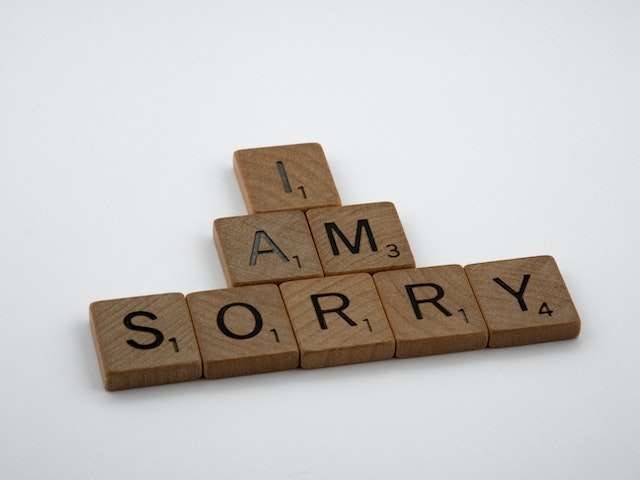Welcome to wikilifestyles.com
Introduction: Why Apologize? 12 Things That Don’t Require an Apology
A common activity that promotes dispute resolution and positive relationship maintenance is apologizing. But, there are situations when we may apologize without needing to, which can damage our confidence and sense of self-worth. While it’s critical to accept responsibility for our actions when we misstep, it’s just as crucial to know when we don’t have to say sorry.
Since it takes less than 4 minutes to read, we respectfully ask that you read the entire article, including the FAQ, without skipping a single sentence. You never know when one of the points could completely alter your life.
In this post, we’ll examine 12 scenarios in which we shouldn’t apologize and explain why it’s important to defend our rights. By the time you’re done reading this, you’ll know when it’s appropriate to apologize and when it’s ok to let go of the guilt and adopt a more positive outlook. So, let’s dive in and discover the things that you don’t need to apologize for.
1. Being in love:
Even though love is a normal and human emotion that enriches our lives by bringing happiness, connection, and fulfillment, we shouldn’t ever feel the need to apologize for loving someone. Being in love with someone is a wonderful experience that improves our emotional and social well-being; it should be embraced rather than shamed. That implies that we are doing something wrong or shameful to apologize for loving someone, which is absolutely not the case.

It’s crucial to accept and truly express our feelings of love without inhibition or worry of backlash. In our relationships, it is essential that we recognize and respect limits and permission, but as long as our love is sincere and respectful, there is no need to feel guilty about it.
To sum up, love is a lovely and normal aspect of the human experience, and we shouldn’t ever feel bad about it. Let’s accept our feelings of love and treasure our relationships with the people who are most important to us.
2. Expressing ‘No’:
Setting boundaries and placing our needs first are essential components of self-care and personal development, so we should never feel bad for saying “no.” Saying “no” can be challenging, particularly when we want to appease people or stay out of trouble. But, it’s crucial to understand that exercising self-respect and self-preservation by saying “no” is a powerful act.
Apologizing for saying “no” can imply that we don’t respect our autonomy or that we don’t have a right to our own needs and wishes. Additionally, it might serve as further evidence that even when doing so violates our principles or well-being, saying “yes” is always the appropriate course of action. Saying “no,” on the other hand, conveys that we have established limits and that we value ourselves enough to put our own wants and ideals first.

Relationships can be strengthened and improved by having clear boundaries and expressing “no.” We build a foundation of trust and mutual respect with others when we can gently and clearly express our requirements and limitations. In addition, it enables us to focus on the things and people that are actually important to us rather than spreading ourselves too thin and being overburdened and anxious.
Saying “no” is a strong boundary-setting and self-respecting action that can help us prioritize our own needs and values, create stronger relationships, and relieve stress and overwhelm. Saying “no” should never require an apology; rather, it should be welcomed as a necessary component of self-care and personal development.
3. Pursuing your dreams:
You should follow your passions and dreams since they are essential to living a fulfilling life. You should be pleased of yourself for putting so much effort and patience into pursuing your dreams.
Saying you’re sorry for going after your dreams suggests that you’re sorry for going after your heart and doing what makes you happy. Never feel bad for following your dreams and enjoying life to the fullest.

Of course, when pursuing your dreams, it’s crucial to keep others’ needs and feelings in mind. But, you shouldn’t let other people’s perceptions or expectations guide your decisions in life.
Be self-assured and proud of your achievements rather than feeling guilty for following your dreams. Appreciate your accomplishments and use them to motivate others to go after their own dreams.
4. Your top concerns:
Every one of us as individuals has particular objectives and issues that are significant to us. It is normal to experience certain problems or difficulties that dominate our thoughts and have an impact on our daily lives. However, there are a number of reasons why we shouldn’t apologize for our top concerns:
- Expressing sorry for our biggest worries implies that they are not important or worth considering. Yet it’s essential to identify and deal with the problems that really matter to us.
- Apologizing for our concerns might make us feel guilty or ashamed for experiencing them, which can result in self-doubt. This might cause self-doubt and make it harder for us to act to solve the problems.
- When we apologize for our worries, it could make other people uncomfortable or uncertain of how to respond. Conversations about the issues that are most important to us may become more challenging as a result.
We should feel empowered to voice our concerns and take action to address them rather than feeling the need to apologize to them. We may work to find solutions and bring about positive change in our lives and communities by being upfront and honest about our main issues.
5. Breaking up a Toxic Relationship:
In most cases, saying sorry for exiting a toxic relationship is unnecessary. Abuse on an emotional or physical level, control issues, manipulation, and other bad behaviors are characteristics of toxic relationships. It is essential to put one’s own health and safety first because these relationships can be hurtful and harmful to one’s well-being.
Dismissing a toxic relationship is a self-care and self-respecting action, and it is not something for which an apology is necessary. The sentiments of guilt and shame that are frequently connected to violent relationships can be exacerbated by apologizing for exiting a poisonous relationship.

Everyone has the freedom to stop a relationship that is not supporting them, and doing so is not a sign of their value or character. This is essential to keep in mind. It’s acceptable to put your own needs first and quit a toxic relationship without feeling bad about it or making excuses.
please do follow our article Toxic Relationships, How do you get into toxic relationship frequently and 7 Proven Steps to Get Rid of Toxic People In Your Life
6. The Flaws you have:
While it’s critical to accept responsibility for our mistakes and failings, apologizing for one’s defects alone is neither necessary nor beneficial. Everyone has flaws since they are a natural and inevitable aspect of being human.
Apologizing for our flaws can damage our self-esteem and reinforce the notion that we are incompetent. Also, it may cause us to feel ashamed or embarrassed of our flaws, which may lower our confidence and self-esteem.
It is more good to embrace our shortcomings as a part of our individuality and focus on bettering ourselves rather than making excuses for them. We can be aware of our areas for improvement while concentrating on our accomplishments and strengths. We can do this without feeling bad or ashamed, allowing us to grow from our mistakes and become better versions of ourselves.
7. Maintaining your Position:
It is not necessary to apologize for maintaining your position, particularly when you are defending your values or your convictions. In order to safeguard your well-being6 and uphold your sense of self-respect, it’s critical to stand up for your principles and boundaries in specific circumstances.

It’s crucial to establish yourself with confidence and respect rather than apologize for holding your viewpoint. This involves being open and truthful about your boundaries and expectations while still being receptive to hearing what other people have to say. It is possible to maintain your viewpoint while remaining non-aggressive and respectful of the demands of all parties concerned.
8. Expressing your Frank opinion:
Giving your honest viewpoint is an important component of communication and can result in fruitful discussions. As a result, you don’t need to feel bad for giving your honest opinion. But, it’s crucial to exercise consideration and respect when sharing your thoughts, particularly if they vary from those of others.

It can be beneficial to approach the topic with tact and diplomacy if you are giving an honest perspective that might be difficult or might potentially offend someone. This may entail speaking in a way that recognizes various viewpoints, being receptive to criticism and dialogue, and refraining from insulting or criticizing others.
In conclusion, sharing your honest view can be a productive and fruitful aspect of communication, but it’s necessary to do so without apology in a respectful and sensitive manner.
9. About your past:
Apologizing for past actions that may have hurt or caused harm to others is not necessarily incorrect. In fact, admitting fault and expressing regret can be crucial steps in moving on and making amends. But, it’s crucial to take the apology’s impact and context into account.
It might not be necessary or suitable to bring up an older incident if you are offering an apology for it. Continually expressing regret for past transgressions may come across as fake or attention-seeking and may not result in useful dialogue or action.
It might be more beneficial to concentrate on making amends and moving forward instead of apologizing for the past. This could involve making an attempt to repair relationships, indicating by your actions that you have learned from past mistakes, or working to avoid repeating the same mistakes.
In conclusion, it is crucial to evaluate the context and impact of your apology and to concentrate on taking constructive actions to make amends and move forward, even though it may be appropriate to apologize for past crimes or harm is done to others.
10. Not knowing the Answer:
It’s essential to realize that being uncertain of the answer to a question is very natural and appropriate. Nobody can be expected to know everything, and assuming that they do is ridiculous. There is no need to apologize for not knowing the solution as a result.

Furthermore, expressing regret for not having the answer can occasionally come out as insecure or unqualified. Rather than apologizing, it can be more beneficial to only state: “That’s a wonderful question, and I’m not sure of the solution, but I can look into it and come back to you. Please allow me some time to look into it.”
You exhibit professionalism and a desire to learn by being honest about your inexperience and exhibiting a desire to find the answer.
11. Being a Newbie:
Especially if you are in a professional beginning or learning a new talent, you do not need to apologize for being a newbie. Being new to something is a normal component of learning, and it’s nothing to feel embarrassed or sorry about.

It may appear that you lack confidence or are unprepared for the work at hand if you apologize for being a novice. It may be more helpful to confess your inexperience than apologize and, if necessary, seek direction or explanation. For instance, you might remark, “I’m still learning. Could you please explain that again?” or “I might need some extra support coming up to speed as a new member of the team.”
You show that you are willing to learn and that you want to do your best by being honest about your level of experience and by asking for assistance when you need it. Instead of being regarded as someone who is apologizing for their lack of expertise or experience, this can help you win the respect and support of your peers.
Last but not least
12. Being truthful:
There is always a need, to tell the truth, and there is usually no need to apologize for it. Integrity and trustworthiness are important characteristics of honesty, and both personal and professional relationships reward honesty.

By apologizing for speaking the truth, you risk placing blame on the reality of the circumstance and the veracity of your claims. Also, it can suggest that you lack faith in your convictions or are making an effort to win over others.
But, it’s crucial to think about the effect your words will have on other people. It could be fair to show empathy or compassion if your candor causes harm or upset sentiments. To give one example, you could say “If what I said offended you, I’m sorry. I didn’t mean to say it, but I thought it was essential to be truthful.”
Truthfulness is often regarded as a positive quality, and it’s critical to stick to your core views. It may be more fruitful to discuss the matter in an open and courteous manner rather than apologize for being honest if your candor causes discomfort or disagreement.
There are many more attributes for which you shouldn’t apologize; here, we’ve only highlighted a few that are particularly important for improving your personality.
Please go through this link to find similar kind of article
Conclusion: Why Apologize? 12 Things That Don’t Require an Apology
It’s not always necessary to apologize, despite the fact that it’s a strong weapon. You can adapt these 12 occasions where you can avoid saying “I’m sorry” and still retain positive interactions and productive dialogue.
Please share this article with your friends and your loved ones and if you have any queries or comments please post it on below shown box ,for more such articles visit https://wikilifestyles.com
